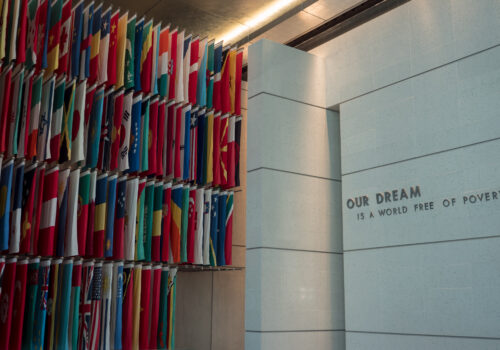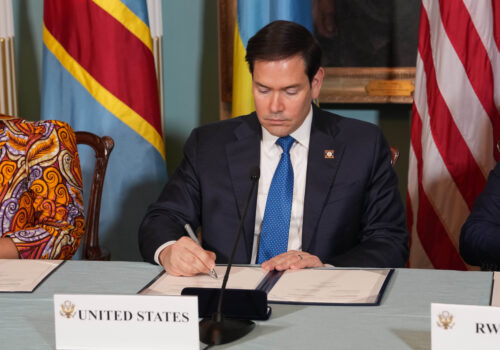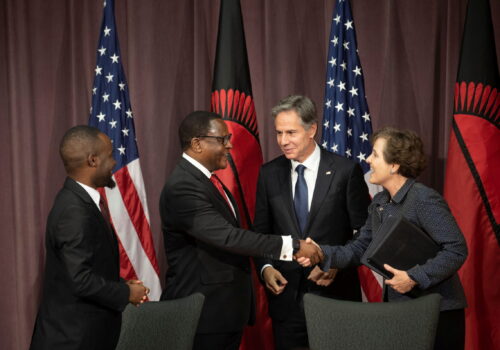Why the Millennium Challenge Corporation is vital to the future of US competitiveness
The United States’ unparalleled economic might is a potent weapon, one that can be deployed to safeguard its interests against escalating threats from adversaries and sustain its prosperity. US economic statecraft should leverage this financial dominance to neutralize adversaries, shield domestic jobs and industries, and amplify US exports.
Now in its twenty-second year and boasting a roughly one-billion-dollar budget, the Millennium Challenge Corporation (MCC) is meant to be a vital pillar of this approach. I served as the head of the MCC this year, as the second Trump administration acted quickly to refashion the agency as a conduit for strategic grants to select nations. In contrast to the predatory debt traps laid by US rivals and adversaries, the MCC seeks to cultivate resilient, market-driven partners attuned to US goals.
The Trump administration’s transformation of the agency this year, which I helped implement, took shape in two ways.
First, the administration shifted the MCC’s internal evaluation framework for projects, prioritizing the return on investment (ROI) for Americans, strategic alignment with partner countries, and the use of compacts (larger partnerships) and threshold programs (smaller ones) to bolster US influence.
Second, the MCC advanced supply-chain resilience and better positioned the United States for competition with China and other rivals and adversaries. The MCC leveraged investments in allied African nations to diversify US supply chains for strategic minerals and resources, addressing export restrictions imposed by US adversaries.
These efforts abroad pay dividends at home. For small-business owners, the MCC’s tactical investments should allow their goods to enter erstwhile untapped markets. With tariff barriers dropped in the foreign market and compatible standards and processes adopted, the approach is far more holistic than trade alone; rather, it is the forging of deeply embedded partnerships.
MCC’s targeted investments will unlock billion-strong export markets for American companies. In these markets, MCC investments are helping deliver thousands of miles of highways and megawatts of power infrastructure, directly mobilizing industries from manufacturers and automakers to agribusinesses, utilities, and beyond. US firms will gain market entry, furnish expertise, and forge public-private alliances. By working with the MCC’s industry and governmental partners, US companies can ensure alignments and matches ahead of time.
Going forward, this paradigm would increase American prosperity while thwarting adversarial encroachments. Consider the MCC’s $147 million Kosovo Energy Storage Project, which is projected to deliver an ROI for American taxpayers of 6-12 percent and will blunt foes’ ambitions in the Western Balkans, where China’s Belt and Road Initiative has invested heavily.
Exports propel US growth by scaling production, thus diluting unit costs at home. Liquefied natural gas exporters exemplify this: Expanded European and Asian demand spreads fixed costs, curbing prices for US consumers. Exports buffer domestic downturns, as evidenced by 2024 agricultural shipments to China ($24.7 billion) and Mexico ($30.3 billion). Global competition spurs innovation, enriching homegrown technologies. Moreover, exports erode the $918.4 billion trade deficit, bolstering economic vigor and furnishing the leverage to project American influence worldwide.
Economic diplomacy is also among the United States’ most potent weapons to push back against adversaries’ efforts to dominate sensitive areas such as the Arctic and the Pacific. The MCC will operate in the South Pacific, in part to try to address China’s $3.55 billion in infrastructure incursions across fifty hubs, including ports, airports, fisheries, and smart grids. Programs in Fiji, Tonga, and the Solomon Islands will seek to assert US influence within island chains sitting atop critical naval corridors. The United States is thus not merely reacting to its adversaries; it is reshaping the geopolitical chessboard itself.
Securing critical minerals—including rare-earth elements (REEs) vital for semiconductors, defense, and electronics—forms another pillar of the MCC’s statecraft. China dominates 90 percent of global REE refining and 70 percent of production, with recent export restrictions limiting US access. It therefore made sense for the MCC to actively seek access to these minerals, with the goal of reducing dependence on hostile nations and strengthening US supply chains. Imagine American factories, once stalled by scarcity, humming with steady mineral inflows for technological and security imperatives.
The MCC’s work is designed to de-risk ventures globally, curating its selections to optimize exports, job creation, wage gains, and manufacturing alongside US energy independence. MCC’s infrastructure and artificial intelligence pursuits are meant to kindle innovation in American firms and sharpen the United States’ competitive advantage in any global contest.
US economic statecraft is of course about more than just the MCC. From the Committee on Foreign Investment in the United States closely scrutinizing deals to the Treasury Department issuing sanctions to the Department of Homeland Security’s Forced Labor Enforcement Task Force investigating the integrity of supply chains, the renewal of US economic statecraft depends on the ability to weave these threads into a coherent and vibrant assemblage.
In a perilous era, investing in kindred spirits and trusting genuine allies can advance multigenerational prosperity in the United States by securing resources, hardening defenses, and cementing leadership. As the MCC ignites demand for US products overseas and helps keep Americans safe here at home, policymakers might consider these important lessons.
Sohan Dasgupta, PhD, is an attorney who previously led the Millennium Challenge Corporation.
Further reading
Fri, Nov 7, 2025
Without development finance, the United States can’t deliver on strategic investment
Econographics By Jessie Yin
The United States isn't the only traditional lender to move from aid to investment. But the current administration is going to struggle to achieve its strategic goals without effective development finance.
Tue, Nov 4, 2025
The Millennium Challenge Corporation is needed for peace in the Great Lakes Region—and US mineral security
AfricaSource By Aubrey Hruby
The Trump administration must back its diplomacy by demonstrating the United States' willingness to turn fragile deals into local development.
Thu, Apr 24, 2025
The Millennium Challenge Corporation could prove essential in the race for critical minerals. Reform it, don’t shut it down.
Issue Brief By Aubrey Hruby
As the Trump administration aligns foreign aid with core strategic interests, the MCC represents an underutilized asset.


